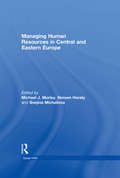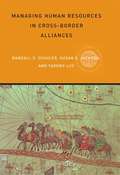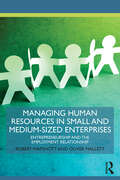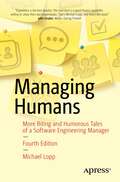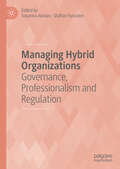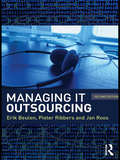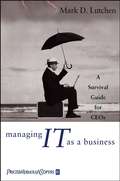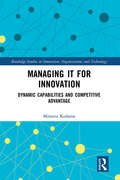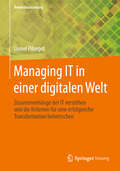- Table View
- List View
Managing Human Resources in Asia-Pacific: Second edition (Global HRM)
by Arup Varma Pawan S. BudhwarGiven the enormous economic and developmental changes being experienced by nations in the Asia-Pacific region, and the related movement of people between and across countries, it is critical that we better understand the HRM policies and practices of these nations. The latest instalment in the Global HRM series, Managing Human Resources in Asia-Pacific (2E) presents the HRM situations in a number of South-East Asian and Pacific Rim countries, highlighting the growth of the personnel and HR function, the dominant HRM system(s) in the area, the influence of different factors on HRM, and the challenges faced by HR functions in these nations. This edition extends its coverage to Cambodia, Fiji, Indonesia, and the Philippines; a new chapter discusses HR research challenges in the region, such as the transferability of western constructs, problems with data collection, and the emergence of MNEs from Asia Pacific.
Managing Human Resources in Central and Eastern Europe (Global HRM)
by Michael J. Morley Snejina Michailova Noreen HeratyAgainst the backdrop of ancient cultures, a communist legacy and eventual institutional atrophy, many of the societies of Central and Eastern Europe have pursued aggressive development trajectories since the early 1990s. This part of Europe is now characterized by a rising economic heterogeneity and a rapidly changing socio-cultural context, underscored by waves of restructuring, privatization, increasing foreign direct investment and an emerging individualism. While there has been a growing interest in the transition economies in the past number of years, the contemporary nature of human resource management in these societies is not well-documented. This long-awaited text seeks to chart the contemporary landscape of HRM in this region. In doing this, it describes key aspects of the transition process as experienced in each of the economies under consideration, as well as describing key legislative and labour market developments and reforms. Finally, it discusses key trends in HRM policy and practice.
Managing Human Resources in China
by Yu ZhengChina is undergoing a dramatic transition from the old to the new as the country integrates into global product and labour markets. Managing Human Resources in China examines the emergence of new and hybrid forms of employment practices within Chinese Multinational Corporations (MNCs) from the perspective of local stakeholders. These include managers, workers and government officials, who take part in strategic planning and policy implementation whilst coping with the pressure of an ever-changing environment. Working in and observing four foreign-invested manufacturing plants located in one of China's new industrial clusters, Yu Zheng offers a fresh perspective on the management of MNCs. The voices of employees have not been heard before, yet they are the critical actors in China's transformation through foreign direct investment. This book explores the pains and gains, achievements and setbacks of managing the Chinese workforce, which is ever pragmatic, increasingly assertive and constantly evolving.
Managing Human Resources in Cross-Border Alliances
by Yadong Luo Susan E Jackson Randall S SchulerAcross the world, companies are forming some of the most complex and exciting collaborations in the business world: cross-border alliances (CBAs). Yet while this offers multinational companies a way into the global marketplace, there is no guarantee of success.This book looks at the business and human resource issues arising in these complex collaborations, putting forward the case that the handling of these issues can determine the CBA's success. The book takes readers through the two main kinds of CBA - International Joint Ventures (IJV), and International Mergers and Acquisitions (IMA) - explaining how each type works and which human resource issues will arise. As well as analyzing these issues and explaining the relevant management, economics and sociological theories, this impressive text uses short end-of-chapter case studies and in depth end-of-text case studies to provide numerous practical examples. The first major textbook that seriously studies human resource issues in a CBA context, this book offers both students of human resource / international business and practicing human resource professionals alike the frameworks for truly understanding the complexities of the area.
Managing Human Resources in Europe: A Thematic Approach (Global HRM)
by Wolfgang Mayrhofer Henrik Holt LarsenThis informative text provides an analysis of the ten most important themes in European HRM. It takes a thematic yet critical approach and includes three distinct country examples in each chapter, paying special attention to dilemmas, controversies, paradoxes and problems in the field. The major themes covered here are the role of the institutional context, the importance of various organizational forms for HRM, the roles and contributions of HRM within the organization and the impact of societal macro-trends on HRM. Written and edited by leading European authorities, this text is essential reading for all those studying or working in HRM in Europe, and allows an exciting synthesis of theory and practice, illustrated with living case studies.
Managing Human Resources in Latin America: An Agenda for International Leaders (Global HRM)
by Anabella Davila Marta M. ElviraIn addition to providing the reader with a thorough overview of the trends in HR strategies and practice and the challenges faced by HR executives in Latin America, this book also explores cultural issues critical to conducting business and understanding human resource management in this region. Structured in two distinct parts, Davila and Elvira's comprehensive book moves from a general overview of the economic, managerial and leadership styles found in Latin America to the current status, role and importance of the HR function in a variety of country-specific chapters including Argentina, Brazil, Chile, Mexico, Central America and Panama. Expert scholars from the region and abroad highlight how regional characteristics affect HRM practices according to the particular development of each country, and country specific chapters focus on: aspects of key institutional determinants of HRM practices (such as laws, politics, economy) the current status, role and importance of the HR function in most firms review practices including pay, staffing and labour relations trends for the near future. Written from a Latin American perspective, and by contributors with interdisciplinary backgrounds, it features topical, original research and forms an essential component of the Global HRM series, complementing the other texts. Using up-to-the-minute case studies, this text is invaluable reading for academics, students and practitioners of HRM, personnel management and international business alike.
Managing Human Resources in North America: Current Issues and Perspectives (Global HRM)
by Steve WernerThis unique text covers the key issues in North American human resources today. Providing an overview of new and emerging issues in North American Human Resource Management (HRM), the chapters are divided into three parts. The first part examines how changes in the business environment have affected HRM; the second part looks at topics that have escalated in importance over the last few years; and the third analyzes topics that have recently emerged as concerns. Each chapter is authored by a leading figure in the field and features case vignettes to provide practical illustrations of the points in hand. The chapters also conclude with guidelines to help HR professionals deal with the issues raised. A Companion Website featuring online lecturer and student resources is available for this text and can be visited at www.routledge.com/textbooks/0415396867. Managing Human Resources in North America is a core text for current issues in HRM courses in North America and a supplementary text for students studying international HRM in other countries. It will be invaluable reading for all those studying HRM in North America or currently working in the field.
Managing Human Resources in Small and Medium-Sized Enterprises: Entrepreneurship and the Employment Relationship (Routledge Masters in Entrepreneurship)
by Robert Wapshott Oliver MallettWell-managed employment relationships can be a secret to business success, yet this factor is relatively poorly understood when it comes to small and medium-sized enterprises (SME’s). Written by active researchers with teaching experience, this book brings together the fields of entrepreneurship and human resource management for the first time, providing entrepreneurship students with a solid grounding in HRM as well as a platform for further critical engagement with the research. The concise and authoritative style also enables the book to be used as a primer for researchers exploring this under-developed terrain. As the only student-focused specialist book on human resource management in entrepreneurial firms, this is vital reading for students and researchers in this area, as well as those interested in small business and management more generally.
Managing Human Resources in the Middle-East (Global HRM)
by Kamel Mellahi Pawan S. BudhwarManaging Human Resources in the Middle East provides the reader with an understanding of the dynamics of HRM in this important region. Systematic analysis highlights the main factors and variables dictating HRM policies and practices within each country. Diverse and unique cultural, institutional and business environment factors which play a significant role in determining HRM systems in the region are also elaborated upon. The text moves from a general overview of HRM in the Middle-East to an exploration of the current status, role and strategic importance of the HR function in a wide-range of country-specific chapters, before highlighting the emerging HRM models and future challenges for research, policy and practice. This text is invaluable reading for academics, students and practitioners alike.
Managing Human Resources in the Oil & Gas Industry
by Michael H. Moffett Steve Werner Andrew InkpenMany factors set oil and gas apart from other industries and make unique demands on its human resource management, including its global nature, the importance of safety, the involvement of governments, proactive stakeholders, a multifaceted workforce, and project focus. Managing Human Resources in the Oil & Gas Industry provides an in-depth look at human resource management for all aspects of the oil and gas sector. The authors provide a full picture of human resource management and its role in staffing, training, performance management, compensation, and labor. This book is relevant to all human resource management department employees and all managers in the oil and gas industry and is suitable for workshops, seminars, and courses in human resource management in the oil and gas industry. This book will help: Show how the oil and gas industry differs substantially from other industries and discusses the implications of these differences for managing human resources Guide managers in the oil and gas sector on how to better manage their employees Describe numerous ways to foster a safety culture Show how effective management of human resources can improve project success Explain ways to deal effectively with the complexities of globalization Provide a detailed analysis of addressing the concerns of various stakeholders through good management of human resources Explain how human resources will recruit and train the next wave of industry workers and leaders during the “Great Crew Change”
Managing Human Resources in the Shipping Industry (Routledge Maritime Masters)
by Jiangang FeiEach industry faces unique human resource management challenges and opportunities and in shipping these include a global labour market and global unionism, long periods spent at sea, and health and safety issues resulting from a variety of risks. This book explores all the key aspects of human resource management in the shipping industry and how they specifically relate to the shipping workforce. The book also discusses the practices and issues associated with recruitment, training and development, and retention of personnel and knowledge in the shipping industry. In addition, the book addresses the human resource management challenges faced by the industry, including achieving work–life balance, maintaining employee health and wellbeing, managing risk and crisis, and applying knowledge management principles. With case studies in chapters exploring how the principles have been put into practice in the real world and discussion questions to prompt further enquiry, this book will be of great interest to students and academics of maritime studies and human resource management more broadly as well as professionals in the shipping industry.
Managing Human Resources: Exercises, Experiments, and Applications
by Alan B. ClardyStudents taking a personnel or human resources management course often do not enter the course bursting with curiosity or unbridled enthusiasm. After all, what kind of excitement can there be in studying how to process payroll, check employment references, or learn about some arcane government regulation? It is unfortunate and ultimately self-defeating if such a mindset about human resources persists, because in today's business world, organizational success and competitive advantage come from the "people" side of the business--a workforce that is highly competent and committed to the success of the organization. The key for students in this field is to learn how to use human resources management (HRM) to achieve this advantage. It is important for students to learn to identify, develop, and manipulate policies and programs to produce desired outcomes. A wide range of critical HRM experiences are presented in this book as either exercises, applications, or experiments--all designed to help students see the choices available and experience their implications in managing the organization. They also offer examples of how HRM function must operate within a framework of rules and regulations. More specifically, this book contains over 30 different situations that illustrate both classic and contemporary human resources problems. It covers the entire spectrum of HRM from establishing policies and goals, through job analysis and evaluation, personnel planning, selection and appraisal, to compensation and benefits, training, organizational improvement, and safety and labor relations. Most of the situations described are drawn from the real-life experiences of managing human resources, including several cases from today's headlines. The case exercises, applications, and experiments are designed to be used as part of regular classroom instruction and can be used with any textbook. The exercises incorporate a number of different learning processes, including case discussions, self-assessments, interviews of others, data analysis, team teaching, testing, experimental observation, program creation and design, role-playing, exercise simulations, training, and participation in experiments. The teacher can use these experiential learning activities to supplement regular classroom instruction; the activities clarify, crystallize, and expand the understanding gained from the lectures. Of special interest: * All of the exercises can be conducted during class times or can be used as homework assignments. * The instructor's manual is organized for easy use with a summary of each case, guidelines for administering each case, plus supplemental or background information. * An exercise planning table links each exercise with the chapters found in a number of the most commonly used HRM textbooks. * Most of the cases are based on actual events, drawn from the author's professional or consulting experience or from events first reported in the national media. Each case is intended to replicate and carry a high degree of fidelity to "real world" conditions as fully as possible. * The experiments in the book are intended to serve as both discovery processes and illustrations of the procedures and rules invoked in developing human resources systems. In many of these experiments, students draw on their own background and perspectives to test out various points of view. The experiments illustrate some of the underlying research that often serves as the basis for HRM policies and procedures.
Managing Human Resources: Productivity, Quality of Work Life, Profits
by Wayne F. CascioManaging Human Resources is for the general management student whose job inevitably will involve responsibility for managing people. It explicitly links the relationship between productivity, quality of work life, and profits to various human resource management activities and as such, strengthens the students' perception of human resource management as an important function, which affects individuals, organizations, and society. It is research-based and contains strong links to the applicability of this research to real business situations.
Managing Human Resources: The New Normal
by Ingrid L. Potgieter Nadia FerreiraThis book volume crafts an exciting, original account on the changes and requirements on managing human resources within the context of the new normal. Chapters in this book report on current research on the key constructs and processes underlying the management of human resources, both on an organisational strategic level as well as an individual employee level. Chapters compare current research trends in terms of future potential directions for the management of human resources within the context of the new normal. The book also critically evaluates the relevance, applicability and utility of the research findings and theoretical premises in various classical, current and potential emerging issues for research and practice in the smart digital technological world of work for human resource management. This volume approaches the concept of managing human resources with the new normal working context from a number of different angles. The authors have categorized them as conceptualizing human resource management in the context of the new normal (Part I), the critical issues in understanding the dynamics of strategic human resources management (Part II), critical issues in understanding the impact of the new normal on the psychology of employees (Part III), and the impact of the new normal on individuals with special needs (Part IV). The book ends in Part V of the volume, with an integrated reflection and conclusion on emerging issues for research and practice. The primary audience for this book volume is advanced undergraduate and postgraduate students in human resource management, as well as scholars in both academic and new normal working contexts. Human resource management practitioners will also have an interest in this book volume.
Managing Humanitarian Logistics
by B. S. Sahay Sumeet Gupta Vinod Chandra MenonThis book discusses emerging themes in the area of humanitarian logistics. It examines how humanitarian logistics and supply chains play a key role, focusing on rapidly delivering the correct amount of goods, people and monetary resources to the locations needed to achieve the success of relief efforts in response to global emergencies such as flood, earthquakes, wars etc. With an increase in the frequency, magnitude and impact of both natural and manmade disasters, effective delivery of humanitarian aid is an issue that is becoming increasingly important in the context of disaster management. The book focuses on how logistics systems and supply chains responsible for delivering this aid from origin to recipients can be made more effective and efficient. It also discusses how the development of information technology systems that can provide visibility to the disaster relief supply chain marks a huge step forward for the humanitarian sector as a whole. As more organizations begin to adopt and implement these systems and visibility is established, the use of key performance indicators will then become essential to further enhance the efficiency and effectiveness of these supply chains.
Managing Humanitarian Relief: An Operational Guide for NGOs
by Eric JamesResponding effectively to humanitarian disasters is far from straightforward, and relief workers often find themselves working in competitive situations or at cross purposes with other agencies. Managing Humanitarian Relief is aimed at relief workers charged with putting together a program of action to help people in extreme crisis. It provides humanitarian relief managers with a single comprehensive reference for all the management issues they are likely to encounter in the field. The book is organized in two parts. First, it provides an outline of different relief programming sectors: food and nutrition, health, water and sanitation, and shelter. Second, it presents 20 separate management topics that are essential for overseeing programs. Its easy-to-use format includes checklists, tables, diagrams, sample forms, and no-nonsense tips from practitioners to help readers in emergency situations.
Managing Humans: Biting and Humorous Tales of a Software Engineering Manager
by Michael LoppRead hilarious stories with serious lessons that Michael Lopp extracts from his varied and sometimes bizarre experiences as a manager at Apple, Pinterest, Palantir, Netscape, Symantec, Slack, and Borland. Many of the stories first appeared in primitive form in Lopp’s perennially popular blog, Rands in Repose. The Third Edition of Managing Humans contains a whole new season of episodes from the ongoing saga of Lopp's adventures in Silicon Valley, together with classic episodes remastered for high fidelity and freshness.Whether you're an aspiring manager, a current manager, or just wondering what the heck a manager does all day, there is a story in this book that will speak to you—and help you survive and prosper amid the general craziness of dysfunctional bright people caught up in the chase of riches and power. Scattered in repose among these manic misfits are managers, an even stranger breed of people who, through a mystical organizational ritual, have been given power over the futures and the bank accounts of many others.Lopp's straight-from-the-hip style is unlike that of any other writer on management and leadership. He pulls no punches and tells stories he probably shouldn't. But they are magically instructive and yield Lopp’s trenchant insights on leadership that cut to the heart of the matter—whether it's dealing with your boss, handling a slacker, hiring top guns, or seeing a knotty project through to completion.Writing code is easy. Managing humans is not. You need a book to help you do it, and this is it.What You'll LearnLead engineersHandle conflictHire wellMotivate employeesManage your bossDiscover how to say noUnderstand different engineering personalitiesBuild effective teamsRun a meeting wellScale teamsWho This Book Is ForManagers and would-be managers staring at the role of a manager wondering why they would ever leave the safe world of bits and bytes for the messy world of managing humans. The book covers handling conflict, managing wildly differing personality types, infusing innovation into insane product schedules, and figuring out how to build a lasting and useful engineering culture.
Managing Humans: More Biting and Humorous Tales of a Software Engineering Manager
by Michael LoppIn this fourth edition of the bestselling business book Managing Humans, author Michael Lopp continues to draw leadership advice from some of the most important software companies of our modern age. Educational stories from companies across Silicon Valley such as Apple, Slack, Pinterest, Palantir, Netscape, and Borland detail the experiences of bright software engineers in an ever-changing industry This revised edition of Managing Humans expands on the previous editions’ explorations of management essentials including handling stress, building diverse teams, running inclusive meetings, and how to lead in times of crisis. The education of a great leader never stops, and Lopp applies crucial insights to help continue your never-ending leadership education. Whether it is approaching a myriad of engineering personalities or handling unexpected conflict, you will come away with wisdom to handle any team situation. The engineering culture of a company can determine the difference between a product’s ultimate success or failure. Managing Humans is here to guide managers and aspiring managers into the intimidating world of people and their vastly different personalities. Handle conflict, infuse innovation into your approach, and be the most confident manager you can be after reading this book.What You Will LearnLead engineersHandle conflictUnderstand different engineering personalitiesWho This Book Is ForManagers and would-be managers staring at the role of a manager wondering why they would ever leave the safe world of bits and bytes for the messy world of managing humans.
Managing Hybrid Organizations: Governance, Professionalism and Regulation
by Susanna Alexius Staffan FurustenA much-needed addition to literature, this timely edited collection aims to provide clarity and understanding on how modern organizations work. The authors explore the characteristics of hybrid organizations in contemporary society, taking into account the complex societal challenges that face businesses today. Arguing that hybrid organizations are in fact not a new phenomenon, this thought-provoking collection goes beyond existing research and re-evaluates our traditional understanding of this concept. Scholars of organization, management and innovation will find this book an insightful read, as it sheds light on the fundamental aspects that shape today’s hybrid organizations.
Managing IT Outsourcing, Second Edition
by Erik Beulen Jan Roos Pieter RibbersOutsourcing is a major international phenomenon in business today. The areas of Information Technology and Management represent a unique case for outsourcing, both in terms of benefits and potential interorganizational problems. This completely revised edition presents the latest theory, research and practice in this fast changing field. With a range of case studies from outsourcing companies across the globe, the book offers a strong grounding in real-world industrial experience and keeps abreast of the most important developments in the field. The book provides expanded coverage of issues such as offshoring, multi-sourcing, business process outsourcing and the spread of offshoring to countries such as China and Russia. Uniquely, this book focuses on both sides of the outsourcing relationship, providing a balanced exploration of the ways in which these partnerships can be managed successfully. Accessible and cutting-edge, the second edition of Managing IT Outsourcing provides an in-depth, practical perspective on this important and far-reaching challenge in information management. It is an ideal text for students, academics and practitioners alike.
Managing IT Performance to Create Business Value
by Jessica KeyesManaging IT Performance to Create Business Value provides examples, case histories, and current research for critical business issues such as performance measurement and management, continuous process improvement, knowledge management, risk management, benchmarking, metrics selection, and people management. It gives IT executives strategies for improving IT performance and delivering value, plus it guides them in selecting the right metrics for their IT organizations. Additionally, it offers knowledge management strategies to mature an organization, shows how to manage risks to exploit opportunities and prepare for threats, and explains how to baseline an IT organization’s performance and measure its improvement. <P><P>Consisting of 10 chapters plus appendices, the book begins with an overview of performance-based strategic planning, after which it discusses the development of a quality improvement (QI) plan, establishing benchmarks, and measuring performance improvements. It covers how to design IT-specific measures and financial metrics as well as the establishment of a software measurement program. From there, it moves on to designing people improvement systems and discusses such topics as leadership, motivation, recruitment, and employee appraisal. <P><P>The final few chapters show how to use balanced scorecards to manage and measure knowledge-based social enterprising and to identify, analyze, and avoid risks. In addition to covering new methods and metrics for measuring and improving IT processes, the author looks at strategies for measuring product development and implementing continuous innovation. The final chapter considers customer value systems and explains how to use force field analysis to listen to customers with the goal of improving customer satisfaction and operational excellence.
Managing IT Projects: How to Pragmatically Deliver Projects for External Customers
by Marcin DąbrowskiUrgent deadlines, constant lack of time, permanent delays - these are the most faithful companions and, at the same time, the greatest enemies of the project manager. Even certified project managers, people with enormous knowledge and a lot of experience, find themselves in a situation where they need great mental resilience in order not to give up. The book is a complete manual for all critical situations a project manager might need to handle along the project’s lifecycle. Written by a project manager with many years of experience, each chapter contains real-life examples with analysis and guidelines. You’ll benefit from the down-to-earth knowledge that usually project managers learn over the course of years in critical and stressful situations with no preparation beforehand. It’s not about academic methodologies – it’s about pragmatic solutions that work in real-life. Far too often, the wise theory of IT project management has nothing to do with reality. Managing IT Projects is your special compendium of knowledge, featuring "project management black magic,” chock full of proven recipes for project managers and IT organization managers, as well as advice on how to act in critical situations.What You'll LearnExamine the main reasons for delays in projects and see where they come from Review the key success factors in managing projects beyond project management methodologies and techniquesUnderstand the critical moments of projects and see how to prepare for themApply a pragmatic strategy and philosophy for successful project delivery and cooperation with customers Who This Book Is ForSoftware developers, project managers, engineering managers and software development directors, sales reps, executive and founders
Managing IT as a Business
by Mark D. LutchenWith Managing IT as a Business you'll get practical advice on how to unleash the full potential of this critical function so that companies can derive maximum benefit. It offers a proven plan for bridging the gap between CEOs and CIOs that has, until now, impeded their ability to work together in order to craft objectives, establish budget guidelines, and develop metrics for measuring IT value and success. In short, with this book as a guide, business leaders will learn how to manage IT as they would any other functional business unit.
Managing IT for Innovation: Dynamic Capabilities and Competitive Advantage (Routledge Studies in Innovation, Organizations and Technology)
by Mitsuru KodamaWith recent advances in IT in areas such as AI and IoT, collaboration systems such as business chat, cloud services, conferencing systems, and unified communications are rapidly becoming widely used as new IT applications in global corporations’ strategic activities. Through in-depth longitudinal studies of global corporations, the book presents a new theoretical framework and implications for IT-enabled dynamic capabilities using collaboration systems from the perspective of micro strategy theory and organization theory. The content of the book is based on longitudinal analyses that employ various qualitative research methods including ethnography, participant observation, action research and in-depth case studies of global corporations in Europe, the United States and Asia that actively use collaboration systems. It presents a new concept of micro dynamism whereby dynamic "IT-enabled knowledge communities" such as "IT-enabled communities of practice" and "IT-enabled strategic communities" create "IT-enabled dynamic capabilities" through the integration of four research streams - an information systems view, micro strategy view, micro organization view and knowledge-based view. The book demonstrates that collaboration systems create, maintain and develop "IT-enabled knowledge communities" within companies and are strategic IT applications for enhancing the competitiveness of companies in the ongoing creation of new innovation and the realization of sustainable growth in a 21st century knowledge-based society. This book is primarily written for academics, researchers and graduate students, but will also offer practical implications for business leaders and managers. Its use is anticipated not only in business and management schools, graduate schools and university education environments around the world but also in the broad business environment including management and leadership development training.
Managing IT in einer digitalen Welt: Zusammenhänge der IT verstehen und die Kriterien für eine erfolgreiche Transformation beherrschen
by Lionel PilorgetDie IT ist für viele Unternehmen unersetzbar geworden. Die Digitalisierung, die in der Zwischenzeit sich verbreitet hat und die Gesellschaft immer weiter prägt, bleibt eine Priorität für viele Unternehmen. Nun hat die Komplexität zugenommen. Es sei die Wahl eines nachhaltigen Partners für eine Cloud Transformation, die Garantie, dass neue digitale Lösungen absolut sicher sind, oder das Angebot eines modernen Arbeitsplatzes, wo Home Office selbstverständlich ist. Entscheidend und gleichzeitig herausfordernd ist die Tatsache, dass alle Ebenen einer IT Organisation gut zusammenarbeiten müssen, damit das Unternehmen sich erfolgreich weiterentwickeln kann. Es handelt sich um die strategische Ebene mit den entsprechenden strategischen Entscheidungen, in erster Linie "make-or-buy" Entscheide. Weiterhin muss die taktische Ebene mit der Durchführung von Projekten und Releases und gleichzeitig das Angebot von hochwertigen IT Services sehr gut funktionieren. Die operative Ebene stellt das Fundament dar, wo die Abwicklung aller Tätigkeiten des Unternehmens sichergestellt werden muss. Verfügbarkeit und Performanz sind Key. Das ganze "Haus der IT" muss in dem Kontext des Unternehmens funktionieren. Die Kultur der Organisation und die Strukturen müssen natürlich berücksichtigt werden. Um eine optimale Transformation der IT ermöglichen zu können, ist es wichtig, ein gutes Verständnis einer IT Organisation zu besitzen und die Zusammenhänge zu verstehen.

